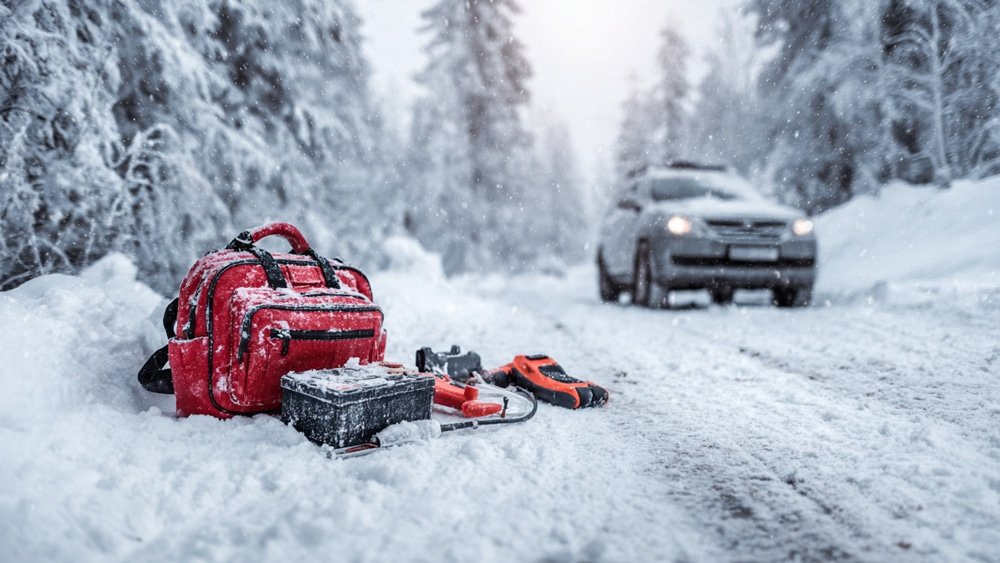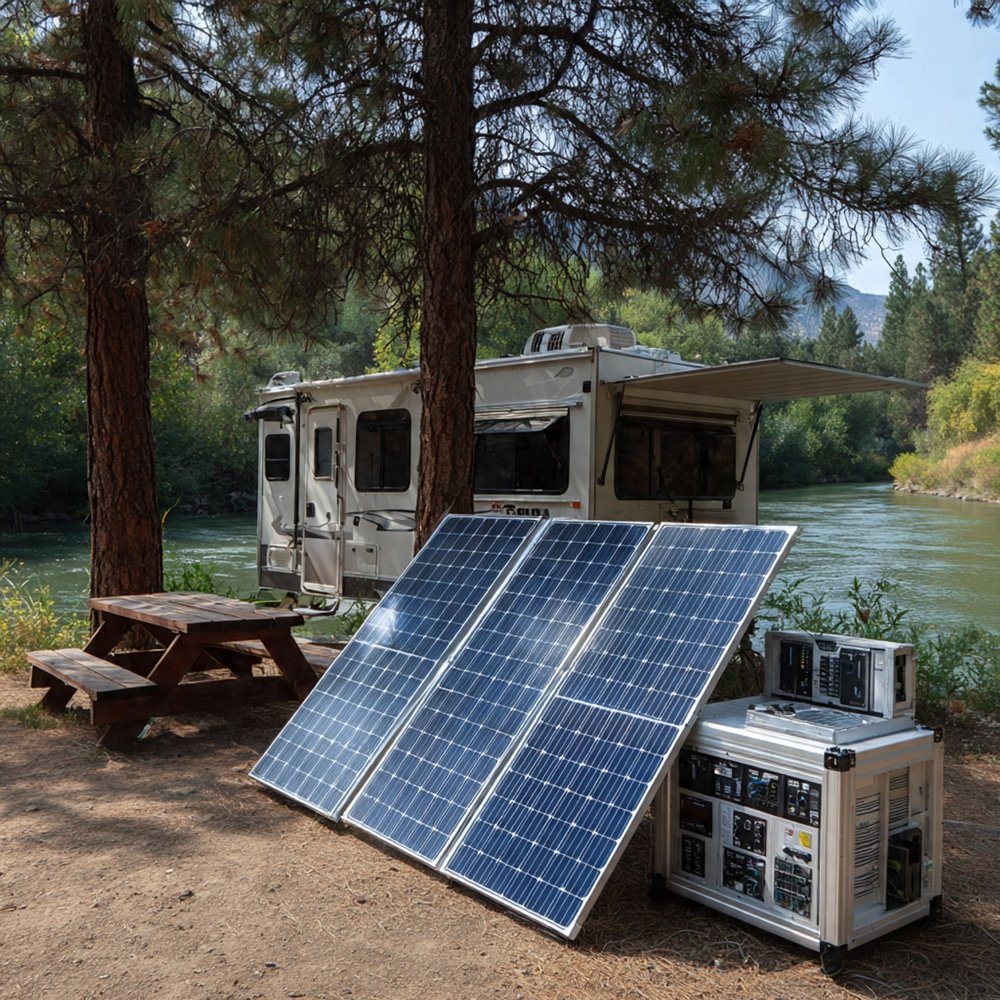Newsflash! You’re not the only one who likes to go camping. In fact, an estimated 57 million households went camping in 2021, according to a report by Kampgrounds of America, Inc. (KOA). With that many campers each year, chances are high that camping grounds will start to feel crowded. But don’t let that deter you from enjoying the great outdoors! With a little camping etiquette, everyone can happily coexist in nature.
If you’re a serious outdoor enthusiast, you’re probably already aware of how to act properly when outdoors. For those of you who are new to camping, or just need a refresher, here are some camping etiquette tips to help you make the most of your camping trip:
[lookbook id=”86041″]
1. Don’t come or leave camp while it’s still dark
Leave home early so you can arrive at the camping grounds before it gets dark. This will help you set up camp more easily and give you time to familiarize yourself with your surroundings. It’s also considerate to your fellow campers, who may not appreciate being woken up in the middle of the night by a running engine. The bright headlights can also be annoying for early birds who just want to enjoy the serenity of the night.
The same goes when you’re done with your camping adventure. Pack up and leave before it gets dark to avoid bothering the remaining campers. Avoid leaving too early, as well. Other campers may still be sleeping. It’s best to leave camp by morning when everyone or at least most of the campers are already starting their day.

2. Keep your distance
Be mindful of where you place your campsite. You’ll want to make sure you’re not too close to your neighbors, as this can make for an uncomfortable camping experience. If the campsite is crowded, try to find a spot that’s at least 200 feet away from other campers.
3. Never walk through another campsite
When walking around the camping grounds, always go around a fellow camper’s area. Do not walk through another campsite, even if there’s no one there. This is considered bad camping etiquette and can damage the camping site. So be sure to stay on designated trails to avoid this major camping faux pas.
4. Keep your campsite clean and orderly
Don’t be an eyesore. Arrange your stuff nicely so your camp doesn’t look like it belongs in a scene of an apocalyptic movie. Store your food in airtight containers or bear bags and put them in the right places. Set aside camping gear that is not in use. When you’re done using them, don’t just leave them lying around.
Dispose of your trash properly. Make sure you bring garbage bags for your trash. Use sealed bags or containers for food scraps. Not only will this make your campsite look neater, but it’ll also keep wildlife away.
5. Keep your voices down
We all know how enjoyable it is to sit around the campfire and tell stories, but remember to keep the noise down after dark. Some people might be trying to sleep, and others might be enjoying the sounds of nature. Either way, it’s important to be respectful of your fellow campers and keep the noise to a minimum.
6. Don’t play loud music
If you’re going to listen to music while camping, please be considerate of your fellow campers. Turn the volume down a notch. Not everyone will appreciate your type of music so make sure it’s just loud enough for you to enjoy. Better yet, use headphones. No one wants to hear your music blaring through the woods.
7. Ask about using a generator
One of the most common complaints of campers is the noise from generators. Before heading to the camping grounds, find out first if generators are allowed. If it is, make sure to ask your camping neighbors that you’ll be using one. Some people might be trying to enjoy the peace and quiet of nature, and the last thing they want is the sound of a machine disrupting that. If you do use a generator, don’t keep it running all day and night. Use it only when necessary.
Your best option is to use a portable solar generator. These camping generators that run on solar power don’t produce any noise, making them more camping-friendly. Plus, it only needs the sun to power your devices.
8. Don’t be a light polluter
Flashlights and lanterns are necessary camping accessories, but that doesn’t mean you should use them carelessly. Be mindful of where you point your light so you don’t shine it in someone’s eyes or tent. When using a flashlight, avoid using the strobe setting as this can be disruptive and annoying. When you’re done using them, turn them off.

9. Don’t bring your pets if they’re not allowed
Check the camping rules before bringing your furry friend. Some camping grounds do not allow pets, while others have restrictions on what types of pets are allowed. If you do bring your pet camping, make sure they’re well-behaved and always clean up after them.

10. Don’t get drunk
Yes, it’s nice to let loose and have a little fun outdoors. But if you have neighbors, you should limit partying, especially if you get drunk easily. No one wants to be camping next to a bunch of rowdy drunks. So if you’re planning on drinking, make sure you do it responsibly.
[lookbook id=”86043″]
11. Be considerate with your campfire
Camping without a campfire just feels wrong. It’s a great way to enjoy the outdoors, but please be considerate when using one. Don’t leave your fire unattended, and keep it under control at all times. You don’t want your smoke to bother your neighbors. You especially don’t want to cause a forest fire. Make sure it’s completely extinguished before you go to bed or leave your campsite. Be mindful of where you build your fire, too. You’ll want to avoid making it too close to trees, bushes, or other camps.
12. Do your business in the right places
When camping, you’ll be using the great outdoors as your bathroom. That’s perfectly fine, but there are some things you need to keep in mind when doing your business outdoors. First, use a portable toilet and discard the contents at a Chemical Disposal Point (CDP) or Elsan Point. If the camping grounds don’t have an emptying point, you have to keep the contents of your portable toilet with you until you get home. Oh, and make sure you’re not in the presence of other campers. Find an area far enough from other people and use a tarp or blanket to cover yourself. You don’t want to moon your camping neighbors.
If you don’t want to store your poop in a bag and wait to get home, you can dig up a cathole with a trowel or small shovel before doing your thing. Make sure the hole is at least 6 inches deep and 200 feet away from any water sources, campsites, or trails. That’s about 70 steps away. It’s also better if the place gets a lot of sun so the excrement can decompose quickly. Finally, always pack out your toilet paper and any other waste. Don’t leave it behind for someone else to clean up. Make sure you have everything before going away to do your business.
13. Do your dishes properly
When camping, you’ll have to wash your dishes in a basin or bucket. You can do this at a CDP, but if one isn’t available, you’ll have to do it at your campsite. First of all, you should avoid leftovers. Prepare just enough food that everyone can finish so you’re left with clean plates. This will make it easier to wash the dishes and lessen your trash.

The key to dishwashing outdoors is to use biodegradable soap and dispose of the wash water properly. Use a portable basin or bucket, and pour the water on dirt or gravel. Do not wash your dishes in natural bodies of water even if you’re using biodegradable soap. It can still pollute the water and harm the ecosystem.
Boil some water and gradually add cold water to lower the temperature enough to handle it without burning yourself. Remove any food residue with a pan scraper before going at it with a sponge and hot, soapy water. Rinse in a separate basin then dry with a clean towel or set aside on a collapsible drying rack. Use a strainer to separate food scraps from the dirty water. Keep the food scraps in a tightly sealed garbage bag or Ziploc then discard the used water in a cat hole. Again, dig a hole far from other campers, trails, and bodies of water similar to what you would do when going to the bathroom in the woods.
14. Leave no trace
This camping etiquette rule is simple: leave your campsite the way you found it. It means not damaging any of the flora or fauna in the area. No picking or plucking leaves, flowers, vines, or fruits. No breaking off of branches or twigs and definitely no carving into trees or rocks. Also, never trample or lie down on a field of beautiful grass and flowers just to take a selfie. Just look and take pictures without disturbing the place so other people can enjoy the same scenery as you found it. If everyone followed this rule, camping would be a more enjoyable experience for everyone.
15. Don’t move firewood
You may be tempted to gather fallen branches around the camping grounds to use as firewood. These pieces of wood are home to some invasive insects and parasites that can cause infestation when moved to other areas. Ask camping grounds personnel for permission before gathering and using firewood onsite. If they say it’s not allowed, don’t touch them. Most camping grounds and parks offer heat-treated firewood that’s certified safe to use in their vicinity so ask for them instead.
If it is permitted to use onsite firewood, gather those around 10 miles from where you are making your campfire. Never bring the firewood home or to your next camping destination. You might inadvertently introduce these foreign pests to new areas, which can cause damage to the local ecosystem. With that in mind, don’t bring your own firewood that you picked up at home or somewhere else.
16. Be respectful of wildlife
You’re not the only one enjoying the great outdoors. There are plenty of other creatures sharing the space with you, so it’s important to be respectful of wildlife. We all love seeing animals while camping, but it’s important to remember that they’re wild animals. Never approach or touch another living creature no matter how cute they may be. If King Kong was real, you wouldn’t want him to go anywhere near you, right? Also, don’t feed wildlife. Most human foods will not agree with their stomachs.
Disturbing wildlife is not only dangerous for you, but it’s harmful to the animal. You’re disrupting their natural habitat, which can have adverse effects on them. Enjoy wildlife from a distance and leave them be. If you want to get a closer look at some wildlife, use binoculars or a camera with a zoom lens.
17. Don’t leave anything behind
Aside from not bothering the camping grounds and the creatures that call them home, the “Leave No Trace” principle also includes not leaving anything behind such as trash, food scraps, used toiletries, and feminine products. Basically, you take everything you brought to the camp back home with you. Nothing more and nothing less. As they say, take nothing but pictures and leave nothing but footprints.
Be sure to clean up after yourself, and dispose of any trash properly. Don’t leave your campsite a mess for someone else to deal with. Not only is it inconsiderate, but it can also attract animals to the site and endanger other campers in the area. Before you leave, inspect your camping area thoroughly for anything that doesn’t belong there. If you see something that’s not yours, don’t assume somebody else will take care of it.
18. Be prepared
Another important camping etiquette rule is to be prepared. That means having all the supplies you need for your camping trip, including food, water, shelter, and first aid. It also means knowing the area you’ll be camping in and being aware of the potential dangers. By being prepared, you can avoid camping disasters and other nuances that can cause trouble not only for you but for other campers as well.

19. Be nice to your camping neighbors
This camping etiquette rule is simple: be respectful of other campers. Aside from the tips already mentioned, you should also be nice and courteous to other campers. Many people go camping to get away from the noise and bustle of everyday life, so they may rather want some privacy. While you should respect other campers’ personal space, it wouldn’t hurt to send some hi’s and hello’s when you encounter them. Even a simple smile will do. You don’t have to be best friends with your camping neighbors. And in case you strike up a conversation with your neighbor, make sure to excuse yourself nicely if you have something else to do. Don’t take up too much of your fellow campers’ time, too, especially if you’re the one who started the convo. You should know how to read the room, so to speak. Cut your conversation short if you feel that your neighbor is getting uneasy or is in a hurry.
20. Follow the camping rules
When camping, it’s important to follow the rules set by the campsite or park you’re in. These rules are there for everyone’s safety and to protect the environment. Ignoring them can put you and others in danger, so make sure to adhere to them. If you’re not sure about a particular rule, ask a camping staff member or another camper for clarification. It’s always better to be safe than sorry.

Camping is a great way to get outside and enjoy nature, but it’s important to remember that you are in someone else’s space. When you go camping, be sure to observe camping etiquette and proper outdoor manners so that everyone can have a good time. Discover more camping tips over at Gentleman Pirate Club, and your next outdoor adventure is sure to be a success!
Just a disclaimer – We have partnered with these companies because we use their products and/or proudly trust and endorse them – so we do receive a commission if you make a purchase or sign up for services. Often, we are able to negotiate special discounts and/or bonuses, which we will pass on to you via our links. We often get short notice on sale items available for 24-48 hours as we will pass these savings on to you.





















3 Responses
Your article helped me a lot, is there any more related content? Thanks!
Thanks for sharing. I read many of your blog posts, cool, your blog is very good.
Your article helped me a lot, is there any more related content? Thanks!